I was intrigued. It so happened that I picked up a library book that had been left behind by a neighbour who had died, and for lack of something else to read opened it. I soon became intrigued as it related so closely to the current reality of COVID-19, as well as the work I have been doing myself on the new Advent-Christmas booklet, LOVE CAME DOWN AT CHRISTMASTIME and the life and times of St Francis.

The story in the book The Turn of Midnight by Minette Walters, although a work of fiction, revolved around a historical fact. The plague, the Black Death, hit the north of England around 1348 and over time almost half of the population of the country died a sudden, quick and painful death. Many villages were wiped out completely, while in one particular place the plague was contained. Lady Anne, the widow of the landowner and Thaddeus, a serf, whom she had nurtured and educated, had the insight to take the right measures. Although there were good priests, who did care for the sick, and many of whom died alongside them, church powers claimed the pandemic was a punishment from God for the sinfulness of the people and held this threat over their heads with harsh cruelty.
The two lay people Lady Ann with the help of Thaddeus became one with their people, ruled with compassion, but firmly through respect and obedience, not threats, fear and force. They built a moat around the manor house and kept everyone isolated, or in quarantine, killing rats and the fleas they were infested with believing these to be the cause of the epidemic. The story unfolds with interesting human angles of course, but a clear message was the stupidity and gullibility of the bulk of the population in the face of this pandemic and the power and control of the church over the masses, irrational as their stance was. Made me think. What about our present day pandemics?
Covid-19 is not the only plague to hit the world in recent times, but it is certainly the most all-encompassing one. It didn’t come from nowhere and authorities and the church – apart from a few extremists – are not blaming people’s sins but begging citizens to obey regulations for their own good, while still making the point that human action and the abuse of the environment has created conditions for such a virus to emerge. WHO, UN and Pope Francis, as the most vocal among religious leaders, have called for solidarity. However, no outstanding political leader, certainly in the west, has been able to call forth such a response. Some countries, notably in Asia, have responded better, but to strict controls and discipline. Although the coronavirus pandemic originated in China, that country because of a more submissive population has suffered less than western countries, in particular the US, where leadership has been abysmal. So much for freedoms and human rights!
HIV/AIDS, (1 December was World AIDS Day) ebola, malaria, gender-based violence are all epidemics of a kind that could be contained with commitment and responsible behaviour.
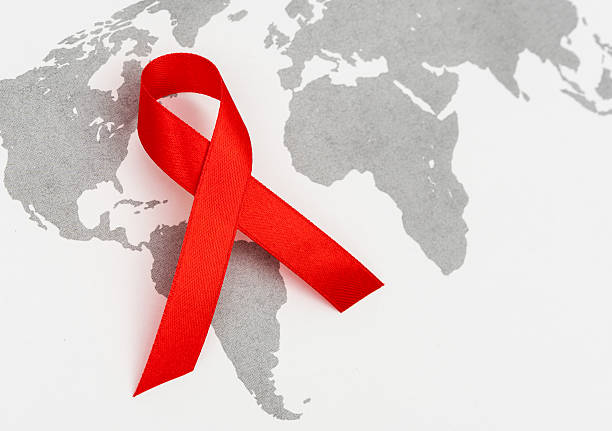
What is the answer in 2020, as we have entered Advent, the season of HOPE. Is it right to merely hope without taking any action? The readings of the 1st Sunday were a call to be awake, alert, be ready for a day of reckoning, a personal call and social call. Has society, as a whole, lost its sense of solidarity, as called for repeatedly by the WHO? Has subsidiarity, an important Church social principle to take responsibility at a more immediate level, not worked?
Pope Francis in his special programme in March, that he shared with the world, reminded us that we are all in the same boat. Maybe we didn’t look beyond a cruise-liner and see a hospital ship, a refugee barge, struggling in very turbulent waters and at risk of ship-wreck.
Where is our hope? Who is our model? Pope Francis’ latest, Fratelli Tutti, does have some words of advice – if only we would listen. Social friendship amongst people is the key, while God loves each one of us in each family, irrespective and unconditionally. How amazing is that?
For now in this season, let us pray from the document: Lord, Father of our human family, you created all human beings equality in dignity. May our hearts be open to all the peoples and nations of the earth. May we recognize the goodness and beauty that you have sown in each of us, and thus forge bonds of unity, common projects and shared dreams. Amen FAMILY WEEKLY TONI ROWLAND .
REFLECTIONS: DECEMBER taken from the booklet LOVE CAME DOWN AT CHRISTMASTIME. Copies of the e-booklet can be purchased from www.marfam.org.za/shop
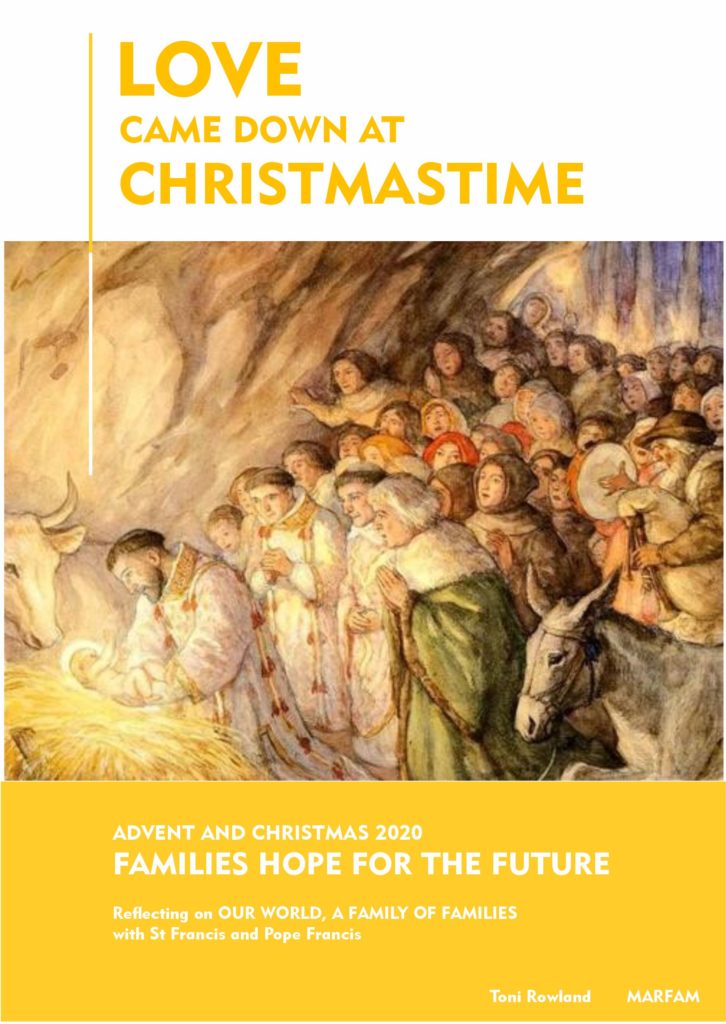
December 5. Creation. Francis was not the first to focus on and praise creation as in his Canticle of the Creatures. The Old Testament especially, contains numerous creation accounts and references, from within particular contexts and different traditions, oral and written. Some details differ but the central message is the wisdom, power and goodness of God and dependence on him for sustaining and providing for all of creation. Over the many centuries of composition of the Old Testament there is a development of understanding. The Psalms are particularly rich in creation images and the book of Job contains beautiful descriptions from the mouth of God to Job.
The creation account in Genesis 1 contains the early acts of creation within the great abyss where a mighty wind blew – symbolic of the Spirit of God. Light and Darkness are separated from one another. On each of six days God added new elements, the sun, moon and stars, the creatures of the sea and air, creatures of the land and finally humankind. After each day of creation God “saw that it was good” and finally, having created humankind, ”God saw that it was very good.”
In the New Testament the Prologue to John’s Gospel refers to creation in a very different way. John refers to Jesus as the Word who was made Flesh, and through whom all things were made. Paul in Col 1:16 develops this further.
St Francis did not see all these elements of creation as separate or of different value. He saw every element as full of beauty, related and connected, as members of the family of creation. This is how it was in the Old Testament as can be deduced from references to “all of creation.” Pope Francis in Laudato Si’ brings this back, stressing the interconnectedness of all creatures. Many hymns too, that we sing regularly do the same although we may not be conscious of this.
Today, in spite of the harm we humans have done to creation, the elements are still beautiful, radiant and precious. We need to go out into the world of nature, to observe and reflect on this to appreciate their beauty and value fully. Science has studied creation in much more depth and we now know so much more about the universe of which our sun and moon are but small parts. As we reflect on the beauty and the destruction in creation we can become conscious too of the link with the Incarnation. Jesus, God’s Word of love, is present and as Crucified Lord bears the imprints of the wounds we have inflicted on the elements, our world.

Francis in his final years, having already received the stigmata and already suffering severely with a sensitivity to light which necessitated his living almost permanently in darkness was inspired to compose the Canticle of the Creatures. He did so in 3 parts. The first is praise of God from the elements of creation, the second includes people, our tendency to conflict and need for forgiveness and healing, and the third part refers to his own imminent death, for which he had already been prepared by Jesus. The Canticle offers rich opportunities for reflection and, after this opening statement, is broken down in the following DAILY THOUGHTS.
Canticle 1. Most high, all powerful, good Lord, Yours are the praises, the glory and the honour and all blessing. To you alone Most High, do the praises belong, and no human is worthy to mention Your name.
For reflection and sharing: As family members research, read up and share on the Creation accounts in the Bible.
December 7. The legend of St Nicholas. Culture is the way of life and beliefs of a people. It is dynamic; it develops and changes over time. Legends are popular stories about glorious deeds of famous people. They are intended to impress listeners and present the good and positive qualities of these men and women. Legends would normally be based on some historical event but details are not necessarily verifiable. Many Christian feasts, even Christmas and Easter, have some of their roots in ancient pre-Christian beliefs that were part of the culture of local people and were Christianised by the Church. This is considered quite acceptable although some Christians do not approve.

The tradition around St Nicholas whose feast day is celebrated on 6 December is based on culture and legends of the time and the place. There are links with the cold and darkness of midwinter and with ancient Viking gods. He is honoured in the Church as a historical figure, a bishop of Myra in 4th century. According to Christian legends he was a good and generous man who gave gifts to children. Over time there were additions to this. Children who had behaved well were rewarded and those who had been naughty would be punished, or not given gifts. Gifts and rejoicing became central and his feast is celebrated with much fanfare in parts of northern Europe, as Sinterklaas and some other variations. The tradition was exported to America where he became the much more secular and materialist Santa Claus.
Some of the legends in The Little Flowers of St Francis of Assisi may well also be built around his character and his actions of compassion towards all of creation. If they are embroidered somewhat, legends are wonderful ways to present powerful and good messages about our heroes and heroines.
The harvest is plentiful but the labourers are few. Luke 10:2. Gospel of day St Nicholas.
Pope Francis: In Cultural ecology there is a need to incorporate the history, culture and architecture of each place, thus preserving its original identity. Ecology protects the cultural treasures of humanity in the broadest sense. Culture is more than what we have inherited from the past, it is also and above all a living dynamic and participatory present reality. LS143.
——————————————————————————————————————————————————————————————–
Copies of the e-booklet LOVE CAME DOWN AT CHRISTMASTIME can be purchased from http://www.marfam.org.za/shop
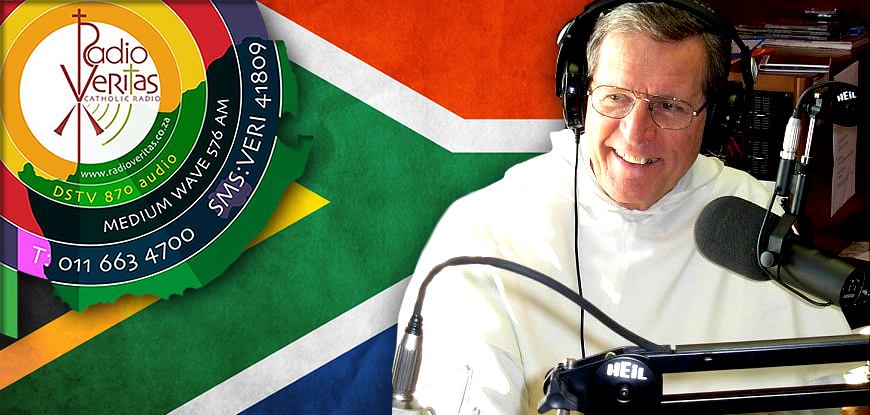
RADIO VERITAS 576am 870 dstv. RIP FR EMIL BLASER 1942 – 2020.
JOIN TONI ROWLAND ON FAMILY MATTERS ON RADIO VERITAS. WEDNESDAY 9-10AM,


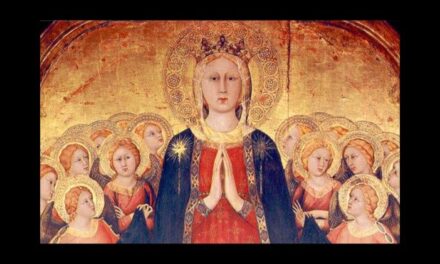
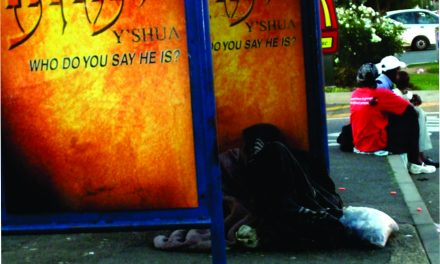

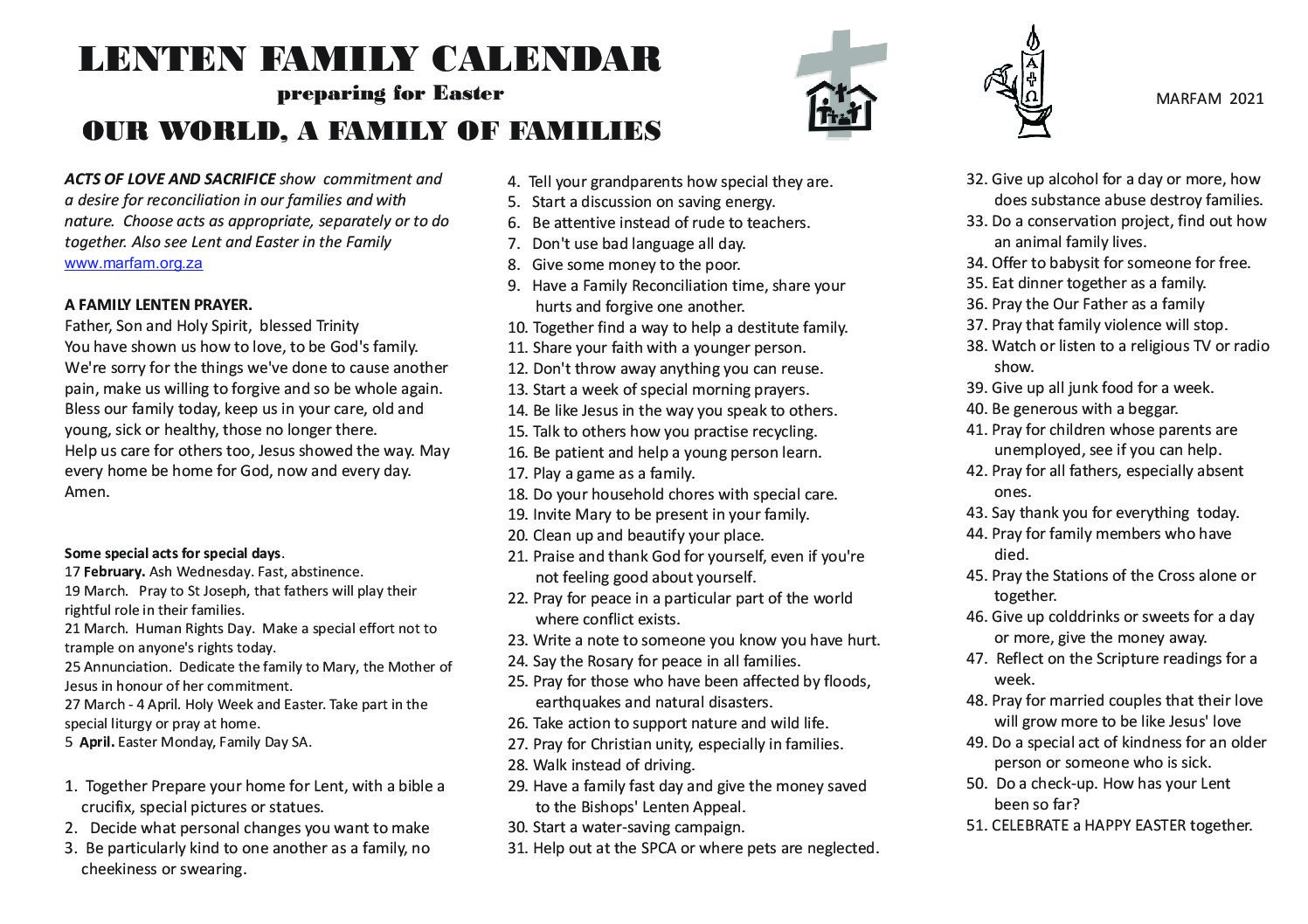
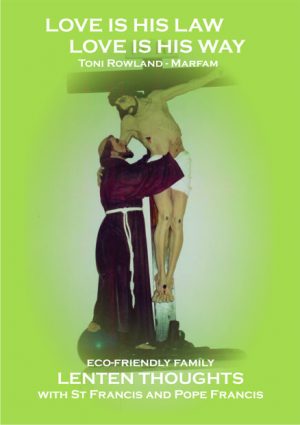
Recent Comments